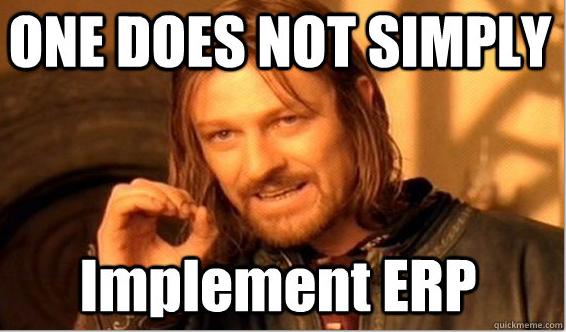Have you ever pondered what CRM or ERP is? How exactly do these systems function in an organization? Or perhaps, what are their uses and benefits? The field of business management has been greatly transformed by the advent of technology, with CRM (Customer Relationship Management) and ERP (Enterprise Resource Planning) being at the forefront of this revolution. Understanding these two models is critical for anyone operating or planning to operate in the business world.
Mainstream businesses struggle to maintain personal relationships with customers whilst managing internal business processes efficiently. According to Forbes1, many companies find it challenging to handle customer relations and internal operations side by side. Additionally, “Harvard Business Review”2 suggests that businesses often neglect necessary stages in their growth due to lack of proper resource planning. CRM and ERP systems were designed to confront these issues, paving the way for smoother processes and enhanced customer satisfaction.
In this article, you will learn about the diverse realms of CRM and ERP. We will delve into the fundamental definitions, functionalities, differences, and the clear cut benefits these systems offer to businesses. Appreciation of these models is not restricted to corporations; small and medium enterprises can gain substantial leverage through their use. An overview of the main components of these systems along with the challenges that come with their implementation will also be discussed.
Moreover, you will discover how CRM and ERP systems play pivotal roles in businesses today. Acknowledging these systems is a key to unlocking potential solutions to struggles businesses face daily. From customer interaction to inventory management, these systems prove to be a game changer in managing businesses efficiently and effectively.

Essential Definitions: Understanding CRM and ERP
Customer Relationship Management (CRM) is a software system that manages a company’s interactions and relationships with both current and potential customers. It aims to improve business relationships to grow sales, and often includes features for sales tracking, marketing automation, contact and lead management.
Enterprise Resource Planning (ERP) is another type of software system used by companies to manage and integrate their core business processes, such as supply chain, services, procurement, human resources and finance. This tool provides an integrated and continuously updated view of core business processes using shared databases.
Unmasking the Powerhouse: Decrypting the Essence of CRM and ERP
Delving Deeper: Understanding CRM and ERP
Customer Relationship Management (CRM) and Enterprise Resource Planning (ERP) are two integral systems that redefine the way businesses operate. CRM’s essence lies in managing and analyzing customer interactions and data throughout a client lifecycle. The main objective is to improve customer service relationships, assist in customer retention, and stimulate sales growth. Data analysis in CRM can give a detailed picture of customers and their behaviours providing valuable insights to plot business strategies.
Business enterprise applications
Microsoft 365 Apps for Enterprise
Enterprise Business apps generator
ERP, on the other hand, is the superhero system that integrates all aspects of an operation, including product planning, development, manufacturing processes, sales, and marketing, in one single database and user interface. The purpose of adopting ERP solutions is to create operational efficiency by providing a real-time and an accurate view of your business. This helps in reducing operational costs, promotes collaboration, streamlines business processes, and aids in decision-making capabilities.
Exploring the Synergy between CRM and ERP
Implementing a CRM helps to increase your business’s profitability by streamlining the operational processes of your marketing, sales, and service divisions, while the implementation of ERP ensures reduced overhead and streamlined processes, thereby increasing the operating profit. However, the beauty of synergy occurs when CRM and ERP are integrated. An integrated CRM and ERP system allows organizations to eliminate bottlenecks, improve process efficiency, enhance customer service, and increase revenue resulting in significant savings in time and financial resources.
- Boosts Operational Efficiency: CRM manages the customer-facing aspect while ERP handles the back-office operations. By integrating the two, businesses can bridge the gap between departments resulting in a seamless workflow.
- Improved Customer Service: With unified access to customer information and data analytics, businesses can ensure faster resolution of queries and improved client relationships.
- Real-time Data Access: Integration ensures real-time access to customer data and metrics, providing a single, comprehensive view of customers, which allows making informed decisions at a quicker pace.
- Increased Revenue: By enhancing the sales, marketing, and service processes (CRM) and streamlining operational and production workflows (ERP), businesses can potentially witness an increase in productivity and revenue.
While CRM and ERP might seem like different tech terminologies, their integration can unlock a great potential for businesses providing an edge to stay competitive in the evolving digital economy. They bolster businesses’ backbone, ensuring a healthier customer relationship, improved operational efficiency, and ultimately driving growth.
Bridging Worlds: Embracing the Synergy between CRM and ERP in Business Revolution
Is Your Business Maximizing the Potential of CRM and ERP?
How equipped is your enterprise to provide an exceptional customer experience while streamlining its core operational processes? Unraveling the essence of that question leads us to two crucial acronyms in business management: Customer Relationship Management (CRM) and Enterprise Resource Planning (ERP). CRM refers to strategies, technologies, and practices that companies employ to manage and analyze interactions and data throughout the customer lifecycle. Its primary aim is enhancing business relationships with clients, focusing on customer retention, and propelling sales growth. ERP, on the other hand, is a type of software utilized by organizations to manage day-to-day business activities such as accounting, procurement, project management, risk management, and supply chain operations. In essence, while CRM is externally focused on clients, ERP dwells on managing internal business processes.
The Dilemma of CRM and ERP Integration
Businesses often grapple with integrating CRM and ERP systems effectively. A disconnected CRM and ERP present numerous challenges such as data duplication, limited visibility into operations, and a hampered decision-making process. Disconnected systems burden businesses with maintaining two separate databases for customer information leading to inconsistent data and potential errors. Additionally, disconnected systems stand in the way of total visibility, a crucial component of efficient enterprise management. The void in communication between the two systems means potentially viable leads fall through the cracks, customer orders are delayed, and the overall customer experience is compromised. Moreover, decision-making becomes challenging due to the lack of real-time, accurate data to guide strategic choices.
Harnessing the Power of CRM and ERP Together
Several leading enterprises have witnessed robust growth and improved operational efficiency by effectively merging their CRM and ERP systems. For instance, global industrial heavyweight Siemens achieved a seamless connection of their CRM system, Salesforce, with their ERP system, SAP. The integration provided real-time customer data across their global sales team, facilitating informed, timely decisions and generating significant efficiency. Likewise, online retailer, Zalando harnessed an integrated CRM-ERP system to manage their explosive growth. The integrated system allowed them to keep track of their rapidly evolving database of millions of customers and manage procurement, inventory, and delivery efficiently. Similarly, Vodafone, known for its world-class customer service, owes part of its success to the synergistic interaction of their CRM and ERP systems. This integration enables them to respond to customer queries expediently while managing their extensive telecommunications network proficiently, hence delivering exceptional customer experience.
Leveraging Success: Illuminating the Potent Impact of CRM and ERP on Business Growth
Understanding the Power of CRM and ERP
What if there was a way to meticulously streamline the day-to-day functions of your business and boost its growth? The key to this lies in CRM and ERP systems. These stand for Customer Relationship Management and Enterprise Resource Planning respectively, and have become two pivotal tools in the world of business. CRM mainly manages a company’s interactions with its customers, while ERP focuses on the integration and management of core business processes. The potency of CRM and ERP systems lies in their ability to help businesses efficiently manage their operations, optimize customer service, and ultimately drive growth.
Surmountable Challenges in Deployment
Despite the inarguable benefits these tools promise, the complexities involved in their implementation tend to be a major roadblock for businesses. A successful CRM or ERP deployment requires not only a significant investment but also substantial expertise. Not all companies have the resources or the knowledge to successfully install and utilize these systems, and hence, they might face inefficiencies and unrealized potential. Moreover, both CRM and ERP systems need to be aligned with a company’s specific business model and objectives. Without a proper understanding and consideration of a company’s infrastructure, deploying these systems might lead to more harm than benefits.
Exemplary Adoption Strategies
AAA Enterprises and BBB Corp. serve as excellent examples of successfully leveraging CRM and ERP systems for business growth. AAA Enterprises implemented an ERP system to integrate its disparate operations under one umbrella. The company reported a 20% increase in productivity due to more efficient processes and better communication flow within the company. BBB Corp., on the other hand, utilized a CRM system to enhance customer engagement. By gaining valuable insights into the customer behavior, the company was able to increase its customer retention rate by 15%. Both these companies clearly illustrate that with the right approach, an investment in CRM and ERP can indeed lead to exponential business growth. Strategically, they understood their infrastructures, analyzed their specific needs, and actively participated in the entire process from deployment to employee training. By continuously evaluating the performance of these systems and adjusting them to their evolving needs, they revealed the potential impact of CRM and ERP on their respective business growth.
Conclusion
While pondering over the vast landscape of business tools and technologies, have you ever wondered how CRM tools could revolutionize your customer interactions? The holistic management of all customer touch-points, from lead generation to post-sales services, can bring about a significant upswing in customer satisfaction and subsequently, your bottom line. As we delve deeper into the unchartered territories of CRM tools, we unearth their profound potential that exists beyond the surface-level functionalities of data organization and contact management.
In a world that revolves around customer satisfaction, it’s a necessity to stay updated with the latest insights in CRM tools. Our blog, a treasure trove of enlightening articles repackaged with real-life examples and best practices, could guide you through your journey towards CRM excellence. New releases on our blog continue to demystify the complex paradigms of CRM tools, walk you through a step-by-step implementation guide, reveal expert tips, and share the success stories of businesses who have harnessed the power of CRM tools. We assure you that our future posts will add value in your quest for knowledge.
Patience, as they say, is the key to catch sight of the sunrise. Similarly, we request you to hold your excitement just a little longer while we finalize our new releases. We promise to bring you nothing less than the best. In the meantime, why not revisit some of our earlier posts or engage with our dynamic community on the discussion forums? Your feedback and participation are integral to our collective knowledge journey. To ensure you do not miss out on our future publications, consider subscribing to our blog and turning on notifications for timely updates. Remember, every enlightening post is just a click away from helping you scale new heights with CRM tools.
F.A.Q.
FAQ
CRM tools, or Customer Relationship Management tools, are software solutions designed to help businesses manage customer data, streamline sales processes, and enhance customer service experiences. These tools allow businesses to build stronger relationships with customers by keeping track of conversations, transactions, and engagements.
CRM tools provide a centralized platform for storing customer-related data, making it easier to follow up with customers and offer personalized service. Moreover, they automate many tasks, freeing up time for the team to focus on other critical business aspects.
Yes, CRM tools are not limited to large corporations. Small businesses can also benefit from CRM tools by improving their capability to handle customer queries and complaints, thus improving overall customer satisfaction and customer retention.
A good CRM tool should offer a comprehensive customer database, sales tracking option, reporting features, and customer-service functionalities. Additionally, look for user-friendliness, integrations with other systems, and customization options to suit your business needs.
The cost of CRM tools varies significantly based on the features provided, the number of users, and the vendor. Some CRM tools offer a freemium model, while others charge a monthly or annual fee. It’s important to understand your budget and needs before selecting a tool.



